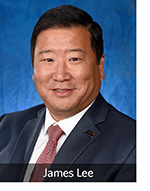The new president of the Financial Planning Association said he will look toward the "power of volunteerism" to advance the organization. He also said the FPA's title protection efforts were at the top of his agenda.
“FPA has been a catalyst in my volunteerism by providing ample opportunities to give back and support a profession that truly changes lives," said James Lee, who started in his role on Jan. 1. "I look forward to using this platform as FPA’s president to encourage others to volunteer while we work to position financial planning as the next great profession.”
Lee succeeded Dennis J. Moore.
Lee has been a member of the FPA for more than two decades, serving on the association’s board the past three years. Lee also served on the association’s regional FPA Board of Directors of Northeastern New York for more than seven years. He is a founding member of the FPA Council of New York, as well as past chair of the FPA's Legislative and Regulatory Issues Committee, now known as the FPA Public Policy Council.
 In addition to his work with FPA, Lee has served on the board of directors of The Prevention Council, Saratoga Arts, and the Saratoga Youth Lacrosse Association. He also served as a member of the Town of Greenfield's planning board and board of assessment review. Lee currently serves as the administrator of Greenfield's Economic Development Revolving Loan Fund.
In addition to his work with FPA, Lee has served on the board of directors of The Prevention Council, Saratoga Arts, and the Saratoga Youth Lacrosse Association. He also served as a member of the Town of Greenfield's planning board and board of assessment review. Lee currently serves as the administrator of Greenfield's Economic Development Revolving Loan Fund.
Lee is president of Lee Investment Management in Saratoga Springs, N.Y. He earned his bachelor's degree in economics from the University of Virginia and is a certified financial planner (CFP). Lee also earned the chartered retirement planning counselor (CRPC) and accredited investment fiduciary (AIF) designations.
In his new leadership role, Lee will work with FPA national volunteer leaders and the FPA’s CEO, Patrick Mahoney.
Lee said in a news release announcing his new position at the FPA is legal recognition of the title “financial planner” through title protection, which the association announced last July as a policy position it would pursue. Title protection would establish universally accepted threshold standards for competency and ethics that anyone claiming to be a financial planner would be legally required to meet, according to Lee.
“FPA believes financial planning is a noble profession worthy of recognition and legal protection,” he said in the news release. “Anyone representing themselves as a financial planner must be qualified to provide these critical services. I’m looking forward to working with my fellow volunteer leaders throughout the FPA ecosystem to move this long-term advocacy goal forward this year and in the years to come.”
In an email, Lee said, “FPA’s pursuit of title protection for financial planners would ensure thart anyone (identifying themselves) as a financial planner has met certain competency and ethical standards just like a doctor or lawyer must meet certain standards. ... Those who do not meet those standards would still be able to work, but would not be able to call themselves a financial planner. FPA believes that title protection would benefit everyone. Financial planners would receive the recognition they deserve for meeting high competency an ethical standards, the public would become more aware of the value of financial planning, and consumers would be assured that their financial planner has the qualifications to stand behind the title.”
Lee maintained that the benefit of requiring a legal standard to call oneself as financial planner—similarly to the legal standards currently required to practice law or medicine—outweighed any possible detriment to a practicing advisor’s livelihood.
“If universally accepted standards to call oneself a financial planner are adopted in law, only those who meet those standards would be able to call themselves a financial planner,” he asserted. “Those who don’t meet those standards could use other titles, such as financial advisor, broker, insurance agent, etc. Moreover, any proposed legislation or regulation could potentially contain a grandfathering clause, which would give those who want to meet the new standards time to achieve them.”
Lee noted that the FPA is not seeking a requirement that anyone seeking to use the title “financial planner” also be a CFP.
Lee said that he viewed title protection as the greatest challenge he will face as FPA president of 2023.
“I like to say that power and purpose flow from clarity,” he said in the email. “My biggest challenge will be to counter misunderstandings and misinformation about FPA’s title protection effort. To that end, I will be meeting with FPA members and other stakeholders throughout the year to create clarity about the title protection initiative.”
With more than 19,000 members nationwide, the Financial Planning Association (FPA), founded in 2000 through the merger of the International Association of Financial Planners (IAFA) and the Institute of Certified Financial Planners (ICFP), is the country’s largest professional organization representing financial advisors.








